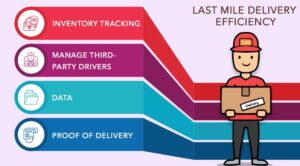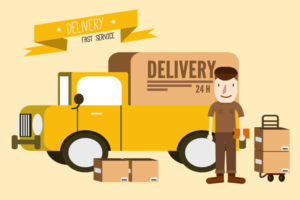Last-mile delivery solutions for logistics are crucial to the success of any freight company. These solutions include last-mile delivery tracking systems and advanced last-mile delivery software packages. These enable companies to track all their shipments to make sure that they are in good hands and to ensure that the best drivers are on board. They also improve efficiency by reducing routing errors and route deviations and thereby extending the life of the railway network.

Logistics Delivery Management Software
In many areas, last-mile delivery solutions for logistics management software is still in its early stages. Most companies are yet to adopt this technology. One reason for this is that it is expensive and, without extensive research, few companies are able to afford it. Even so, as technology improves, the costs are bound to come down and logistics companies can no longer afford to be stingy when it comes to spending money on the latest solutions.
Route Optimization
It is advisable to have a look at the most common last-mile delivery solutions for logistics management software. One of the common pieces of equipment is the route planner. This enables a company to map out the shortest route between two locations. While this route might not necessarily be the quickest way, it is more cost effective than traveling by road. And it has the advantage of not requiring the services of a last-mile driver.
Real-Time Driver Tracking
Another piece of equipment is the last-mile delivery driver. These are highly trained truck drivers who have been approved by the logistics company to take delivery of certain products and services. The drivers use special GPS units to pinpoint their exact location. They then make frequent last-mile delivery calls to the company with instructions on how to drive to the specified locations. The last-mile delivery solutions for logistics companies usually consist of a network of last-mile delivery drivers who call the company on the GPS system to drop offloads.
Last-mile delivery – Relay services
The other type of last-mile delivery solution for logistics is relay services. This is the use of buses, coaches and other large vehicles to deliver individual items or load shipments to specific locations. It is usually employed for small shipments or loadings that are not too large.
Relay services are usually made available to clients that own the products that need to be delivered, and not to companies that will be using the last-mile service. relay services are also very cost effective, as they are not limited to routes that are physically present within a city or town.
Customer communications
Communication between the last-mile driver and the client is very important in this type of logistics solution. For instance, if a truck driver needs to deliver an item to a client’s office, the last-mile driver should be able to verbally communicate the location of the office, the item that is to be picked up and the pickup time. If a driver does not have a way of verbally communicating this information to a client, the logistics company should provide a computerized tracking system for the truck to follow.
Logistics companies can also provide the last-mile driver with a pager or cellular phone to reach the client if the truck is in an accident or needs to be diverted. If a company is unable to provide its employees with cell phones or pagers, the logistics company should provide the necessary technology so that the employee can keep in touch with the client.
Last-mile delivery solutions for Truckers

Last-mile delivery solutions for logistics have come a long way over the years. In the past, when a logistics company delivered an item, it typically consisted of just one truck. As companies grew in size and because of the expansion of services that they began providing, companies often had more trucks and crews available to meet the demands of their customers. The last-mile driver in a small logistics operation did not always have the tools, training and equipment necessary to meet the needs of his company.
However, when companies expanded into new areas, many of the traditional issues arose because the company had to add more employees and facilities. Also, when a customer became disappointed with the product or service that he received, there was not necessarily a way for the logistics manager to properly handle the situation. He could call the customer, but the customer could call the company could still not get the information to the customer quickly enough. The last-mile delivery solutions for logistics help businesses remain competitive by allowing them to meet the demands of their customers while adding staff and facilities when necessary. The ability to offer delivery software for logistics companies helps them remain viable in their local communities.